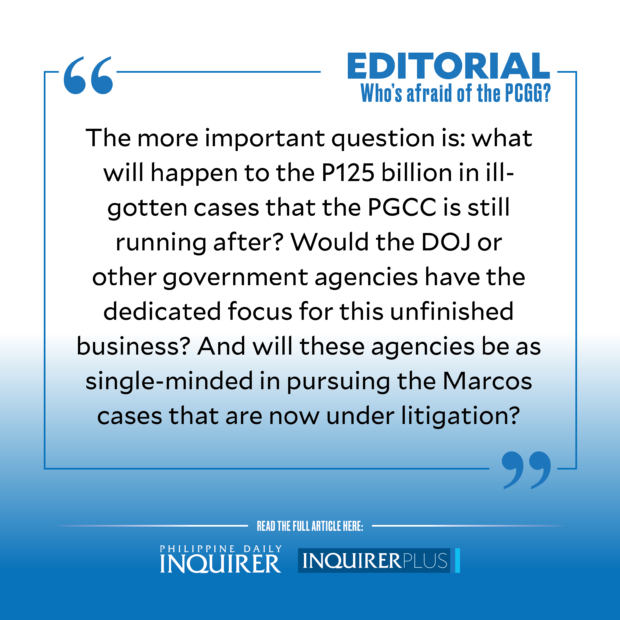Who’s afraid of the PCGG?
Many times in previous administrations, the Presidential Commission on Good Government (PCGG) had been a target of those who felt that the agency, created in 1986 to recover the ill-gotten wealth of authoritarian President Marcos Sr. and his cronies, had outlived its purpose.
As early as 1998, President Joseph Estrada called for the PCGG’s abolition after expressing dismay at how recovery efforts had gone on for 12 years without progress. Several bills had been filed for its abolition over the years but these did not prosper.
In 2011, no less than then PCGG chairman Andres Bautista proposed to President Benigno Aquino III a two-year timetable with which to wind down the commission’s work. He suggested that litigation of PCGG cases be transferred to the Department of Justice (DOJ), while the Department of Finance could handle the disposition of seized assets.
Bautista acknowledged persistent calls to terminate the PCGG due to the mismanagement and corruption that ironically hounded the commission. In 2017, the Sandiganbayan convicted Camilo Sabio of graft for leasing service vehicles without public bidding when he was PCGG chair.
In 2019, the PCGG was slammed for losing a string of cases due to sloppy prosecution, including a P102-billion civil suit against former ambassador Roberto Benedicto and other dummies. The Sandiganbayan, in dismissing the case, said it “took more than 30 years before this case [was] submitted for decision, and yet, the prosecution failed to present sufficient evidence.” Another P267.371 million civil case was dismissed for the same reason. In December 2019, a P200-billion civil case against the Marcoses was also dismissed because the prosecution presented mere photocopies of documents and “did not even attempt to provide a plausible reason why the originals were not presented…”
That the PCGG had monumental failures cannot be disputed. But it should also be credited for its hard-fought victories. As of December 2021, the PCGG reported that it has recovered P265 billion in ill-gotten wealth, certainly, an astounding amount given the difficulties in tracing assets stashed abroad and hidden under elaborate schemes.
Current PCGG chair John Agbayani asserted in a House hearing that the commission remains relevant, noting that it contributes P600 million to government coffers every year. For 2022 alone, he said the commission remitted P850 million to the treasury.
But some lawmakers would not hear of it. “If in 36 years it has not yet finished [its mission], it has failed. How can it be continuing 36 years down the line?” Cagayan de Oro Rep. Rufus Rodriguez asked.
To be fair, President Marcos Jr. has not called for the PCGG’s abolition. Instead, he said it should be strengthened to run after all cases of corruption.
“Strengthen it… ‘Yan ang trabaho nila, pagtibayin mo. Give them a bigger budget. Give them more staff para habul-habulin talaga nila lahat. Then mag-file sila ng kaso sa Ombudsman,” Mr. Marcos said in a CNN Philippines interview during the campaign.
Justice Secretary Crispin Remulla last month said he would propose to the President that the PCGG be turned into a “central asset forfeiture office” for crimes other than the Marcos ill-gotten wealth, among them “nonpayment of taxes, drug trafficking, or other crimes including graft and corruption.” Asked about this, Press Secretary Trixie Cruz-Angeles said that “Right now, there is no policy.”
Given the Palace’s and Remulla’s statements, why are the President’s allies in Congress now adamant about abolishing the PCGG?
Rightsizing the bureaucracy seems a lame excuse to do away with the commission, which has only 131 personnel undertaking a formidable battle to recover hundreds of billions of stolen public funds. There is even no need to expand the PCGG’s mandate, as it is already empowered to go after graft and corruption cases other than those of the Marcoses and their cronies.
The more important question is: what will happen to the P125 billion in ill-gotten cases that the PGCC is still running after? Would the DOJ or other government agencies have a dedicated focus on this unfinished business? And will these agencies be as single-minded in pursuing the Marcos cases that are now under litigation?
While abolition attempts in the past have failed, this time, the PCGG is truly facing a crisis, with the Marcos son now President. Its continued existence is seen as anathema to the redemption that the Marcos family has seemingly achieved with the massive 31 million votes that propelled Mr. Marcos to Malacañang.
While his allies might be tripping over each other to abolish the PCGG to curry favors, Mr. Marcos is presented with an opportunity to exceed expectations by allowing the commission to pursue its mandate and for due process to take its course on the forfeiture cases. It might take a long time to recover the ill-gotten wealth, but with the PCGG around, they won’t be forgotten.





















